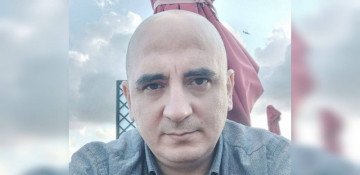Kyiv, September 13
Armenian public figure and commentator Ishkhan Verdyan says the U.S.-supported rehabilitation of the TRIPP/Zangezur road marks a move from talk to implementation and could transform the South Caucasus into the “safest, shortest” land bridge between Europe and Asia – if neighbors normalize relations.
Speaking on the YouTube program Геополитика с Барвиненко, Verdyan welcomed what he described as a first U.S. tranche of $145 million to help Armenia upgrade the Meghri section of the route known in Yerevan as the “TRIPP” (the “Trump Route for International Peace and Prosperity”) and in Baku as the Zangezur corridor.
He argued the sum is “enough to start” and predicted additional funding as works progress. (We could not immediately verify the funding details independently.)
Verdyan framed the project as a test of Armenia’s regional choices. In his view, the South Caucasus is geographically secure so long as states maintain constructive relations with Turkey, which he called the key external partner for regional connectivity.
He suggested Russia’s role should be economic rather than coercive, noting that Russian Railways’ subsidiary already operates Armenia’s network and could profit as a neutral infrastructure manager under Armenian law.
On security, Verdyan contended that the Caucasus mountain topography limits the feasibility of large-scale military scenarios and therefore favors cooperative trade corridors over confrontation.
He repeatedly described the route as one that “starts in Azerbaijan and ends in Azerbaijan,” passing through about 40km of Armenian territory, and said the benefits for Baku extend onward to Nakhchivan, Caspian ports and Central Asia.
Turning to regional politics, Verdyan alleged India’s decision to block Azerbaijan’s entry into the Shanghai Cooperation Organisation reflected New Delhi’s broader geopolitical posture; he presented this as his interpretation and did not provide documentation during the interview.
Inside Armenia, Verdyan voiced support for Prime Minister Nikol Pashinyan’s normalization agenda and said anti-Azerbaijani rhetoric from some politicians misreads Baku’s intentions.
He criticized statements by ruling-party figure Hayk Konjoryan as overstating threats to Armenian territorial integrity—characterizing that as Verdyan’s personal assessment.
He also issued sharp accusations against the ARF Dashnaktsutyun, claiming the party and affiliated activists employ “terroristic methods,” including threats against him; these are his allegations, which we have not independently verified.
Verdyan called for Dashnaktsutyun to be banned or expelled from Armenia. He further predicted that former presidents Serzh Sargsyan and Robert Kocharyan could face arrest, saying Pashinyan now has stronger state institutions and is ready to wield a “steel hammer” against entrenched networks. Those are Verdyan’s forecasts.
Despite the hard edges, Verdyan’s core message was pragmatic: normalize with neighbors, professionalize infrastructure management, and let trade and transit de-escalate politics.
“If our countries find a common language, this becomes the most stable and conflict-free route between Europe and Asia,” he said.


